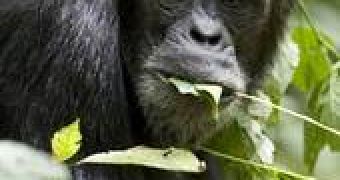Chimps are not quite gentle when eating. And besides being messy during the dinner time, they even engulf dirt while doing this. It may seem fulsome, but our closest living relatives are not stupid: eating soil appears to improve their health and their ability to fight infections. This is the result of a new research published in the journal "Naturwissenschaften".
The research team led by Sabrina Krief, of the Mus?um National d'Histoire Naturelle, in Paris, made an investigation of a chimp population from Kibale National Park in Uganda. When the researchers investigated samples of soil consumed by chimps in the park, they discovered its antimalarial boosting qualities. The team collected the soil samples along with the leaves of Trichilia rubescens, a plant representing one of the preferred food items of the Ugandan chimps.
When ingested alone, the leaves were rather inactive, but when mixed with soil, the antimalarial effect of their chemicals was boosted.
"Scientists previously suspected that animals might eat dirt when stressed or as a source of missing minerals. This new result is the first suggestion that the combination of soil and other foods could have health benefits", said Krief.
"Here we show by eating plants and soil shortly after, the properties of the plants may be revealed or enhanced. It's this association of items which provide potential benefits which is new", she told LiveScience.
The team also analyzed the clay used by healers in the nearby tribes to treat diarrhea. The samples displayed many similarities to the clay ingested by chimps, like a high percentage of kaolinite, the main chemical in many antidiarrheal drugs.
"Local people around Kibale use soil in traditional medicine, associated to different plant parts. It may potentialize the properties of plant or attenuate their toxicity by adsorbing noxious compounds. This discovery could help reinforce the idea that conservation benefits humans and animals alike. This overlapping use by humans and apes is interesting from both evolutionary and conservation perspectives. Saving apes and their forests is also important for human health", said Krief.

 14 DAY TRIAL //
14 DAY TRIAL //